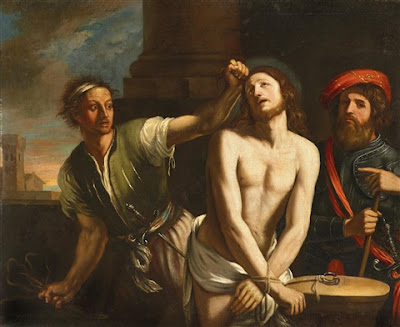 |
| anonymous copyist after Guercino Magdalene Flagellating Herself (copy of lost altarpiece) after 1637 oil on canvas Pinacoteca Communale di Spoleto |
 |
| anonymous copyist after Guercino Magdalene Flagellating Herself (copy of lost altarpiece) after 1637 oil on canvas Pinacoteca Capitolina, Rome |
Guercino's original altarpiece of 1637, installed in the church of the Cappuccini outside Carpi, was destroyed by fire, along with the church, in 1783.
 |
| Guercino (Giovanni Francesco Barbieri) Salome receiving the Head of St John the Baptist 1637 oil on canvas Musée des Beaux-Arts de Rennes |
 |
| Guercino (Giovanni Francesco Barbieri) Salome receiving the Head of St John the Baptist 1637 drawing (head study - Salome) Royal Library, Windsor |
 |
| Guercino (Giovanni Francesco Barbieri) Salome receiving the Head of St John the Baptist 1637 drawing (figure studies - Salome and Attendant) Royal Library, Windsor |
 |
| Guercino (Giovanni Francesco Barbieri) Salome receiving the Head of St John the Baptist 1637 drawing (figure studies - Salome and Attendant) Royal Library, Windsor |
 |
| Francesco Rainaldi after Guercino Salome receiving the Head of St John the Baptist 1796 engraving Staatsgalerie, Stuttgart |
"[Carlo Cesare] Malvasia listed [Salome receiving the Head of St John the Baptist] under 1637 and named the patron as the Duke of Modena, omitting to mention that it had first been commissioned by Ludovico Mastri of Bologna. Francesco I sometimes hijacked the pictures other clients had ordered from Guercino. When he did so, he paid Guercino the amount agreed with the original client. Guercino's letter to the Duke dated 4 August 1637 tactfully alludes to the change of patron, which occurred as the painter was at work on the canvas. In the letter, he says that Alfonso Palettonio, then Governor of Cento, had passed on the Duke's request for the 'decollazione di S. Gio: Batt.a', which he had been painting for Ludovico Mastri of Bologna."
 |
| Guercino (Giovanni Francesco Barbieri) Penitent Magdalene contemplating a Crucifix 1637 oil on canvas private collection |
 |
| Guercino (Giovanni Francesco Barbieri) Penitent Magdalene contemplating a Crucifix 1637 drawing (compositional study) Princeton University Art Museum |
 |
| Guercino (Giovanni Francesco Barbieri) King David rending his Garments 1637 oil on canvas private collection |
 |
| Guercino (Giovanni Francesco Barbieri) King David rending his Garments 1637 drawing (figure study) British Museum |
 |
| Guercino (Giovanni Francesco Barbieri) St Agnes 1637 oil on canvas private collection, Ireland |
"As stated by Malvasia, the [St Agnes] was commissioned in 1637 by Alberto Provenzale of Cento as a gift for Cardinal Girolamo Colonna, Archbishop of Bologna. He paid a deposit of 25 scudi on 4 March and the balance of 40 scudi on 18 June 1637. . . . The price paid by Provenzale was more than Guercino's standard tariff for a half-length figure, so it is posible that in negotiating the commission, a full-length figure was initially considered. A drawing [directly below] in the Prado shows St. Agnes [full length], who is remarkably similar to her painted counterpart, kneeling on the ground holding her martyr's palm, with the lamb looking up at her."
 |
| Guercino (Giovanni Francesco Barbieri) St Agnes 1637 drawing (compositional study) Museo del Prado, Madrid |
 |
| Guercino (Giovanni Francesco Barbieri) The Flagellation 1637 oil on canvas private collection |
"Malvasia said that Guercino painted The Flagellation for Cardinal Baldeschi in 1637, but neither the painting nor the Cardinal's name appear in the account book. However, both The Flagellation and its pendant of the Arrest of Christ [drawing directly below] were published by [Roberto] Longhi as by Guercino in 1968, both with the provenance from the Palazzo Monaldi at Perugia. Benedetto Baldeschi (1588-1644) was a member of the Monaldi family of Perugia."
 |
| Guercino (Giovanni Francesco Barbieri) Arrest of Christ 1637 drawing (compositional study) Princeton University Art Museum |
– quoted texts from The Paintings of Guercino: a revised and expanded catalogue raisonné by Nicholas Turner (Rome: Ugo Bozzi Editore, 2017)